58 start with M start with M

The functioning of the U.S. government is a bit messier than Americans would like to think. The general understanding of policymaking has Congress making the laws, executive agencies implementing them, and the courts applying the laws as written—as long as those laws are constitutional. Making Policy, Making Law fundamentally challenges this conventional wisdom, arguing that no dominant institution—or even a roughly consistent pattern of relationships—exists among the various players in the federal policymaking process. Instead, at different times and under various conditions, all branches play roles not only in making public policy, but in enforcing and legitimizing it as well. This is the first text that looks in depth at this complex interplay of all three branches.
The common thread among these diverse patterns is an ongoing dialogue among roughly coequal actors in various branches and levels of government. Those interactions are driven by processes of conflict and persuasion distinctive to specific policy arenas as well as by the ideas, institutional realities, and interests of specific policy communities. Although complex, this fresh examination does not render the policymaking process incomprehensible; rather, it encourages scholars to look beyond the narrow study of individual institutions and reach across disciplinary boundaries to discover recurring patterns of interbranch dialogue that define (and refine) contemporary American policy.
Making Policy, Making Law provides a combination of contemporary policy analysis, an interbranch perspective, and diverse methodological approaches that speak to a surprisingly overlooked gap in the literature dealing with the role of the courts in the American policymaking process. It will undoubtedly have significant impact on scholarship about national lawmaking, national politics, and constitutional law. For scholars and students in government and law—as well as for concerned citizenry—this book unravels the complicated interplay of governmental agencies and provides a heretofore in-depth look at how the U.S. government functions in reality.

Advance directives—such as living wills and health care proxies—are documents intended to declare and preserve the health care choices of patients if they become unable to make their own decisions. This book provides a comprehensive overview of advance directives and clear, practical directions for writing and interpreting them.
Nancy M.P. King provides a legal, philosophical, and historical analysis of the moral and legal force of advance directives. She explains the types and models of advance directives currently in use and offers guidelines for individuals seeking to write, read, and use directives to promote individuals' health care choices within the laws of their own states.
King emphasizes that advance directives are not orders given by patients to their doctors; instead, they are documents that invite conversation between doctors and patients about health care decisions of great importance. The purpose of advance directives is to support patients' health care choices, and the book promotes a thoughtful use of advance directives that is best calculated to achieve that purpose, whatever form individual advance directives may take.
This new edition has been updated to reflect the many changes in advance directive statutes since 1991, including expanded discussions of health care proxy statutes, the impact of the Patient Self-Determination Act and the Supreme Court's Cruzan decision. King also has extended her analysis of the implications for advance directives of managed care, resource allocation, resource scarcity, and the debate over futile treatment at the end of life.
Making Sense of Advance Directives is a valuable handbook for patients, health care providers and administrators, patient counselors, lawyers, policymakers, and any individual interested in advance directives.

Shattering the myths about what’s wrong with managed health care, this penetrating introduction to managed care explains its origins and identifies its real achievements and shortcomings.
Walter A. Zelman and Robert A. Berenson argue that many criticisms of managed care tend to idealize the costly and fragmented insurance system it supplanted, without pinpointing the true inadequacies of today’s managed care. In addition to providing reasoned answers to the most alarmist critiques of managed care, the authors maintain that it has not fulfilled its potential to improve the overall quality of care.
The authors propose thirteen concrete recommendations for raising quality in managed care programs, ranging from enacting additional legal protections and increased disclosure to putting the purchasing power in the hands of those who care most about quality — individuals, rather than employers.
With practical solutions for making managed care better, The Managed Care Blues and How to Cure Them is a bold call for greater consumer protection, knowledge, and power in the health care arena.
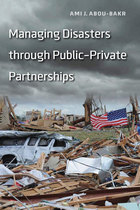
The terrorist attacks of September 11, 2001, and Hurricane Katrina in August 2005, generated a great deal of discussion in public policy and disaster management circles about the importance of increasing national resilience to rebound from catastrophic events. Since the majority of physical and virtual networks that the United States relies upon are owned and operated by the private sector, a consensus has emerged that public-private partnerships (PPPs) are a crucial aspect of an effective resilience strategy. Significant barriers to cooperation persist, however, despite acknowledgment that public–private collaboration for managing disasters would be mutually beneficial.
Managing Disasters through Public–Private Partnerships constitutes the first in-depth exploration of PPPs as tools of disaster mitigation, preparedness, response, and resilience in the United States. The author assesses the viability of PPPs at the federal level and explains why attempts to develop these partnerships have largely fallen short. The book assesses the recent history and current state of PPPs in the United States, with particular emphasis on the lessons of 9/11 and Katrina, and discusses two of the most significant PPPs in US history, the Federal Reserve System and the War Industries Board from World War I. The author develops two original frameworks to compare different kinds of PPPs and analyzes the critical factors that make them successes or failures, pointing toward ways to improve collaboration in the future.
This book should be of interest to researchers and students in public policy, public administration, disaster management, infrastructure protection, and security; practitioners who work on public–private partnerships; and corporate as well as government emergency management professionals and specialists.

Managing the Fiscal Metropolis: The Financial Policies, Practices, and Health of Suburban Municipalities is an important book. This first comprehensive analysis of the financial condition, management, and policy making of local governments in a metropolitan region offers local governments currently dealing with the Great Recession a better understanding of what affects them financially and how to operate with less revenue.
Hendrick’s groundbreaking study covers 264 Chicago suburban municipalities from the late 1990s to the present. In it she identifies and describes the primary factors and events that affect municipal financial decisions and financial conditions, explores the strategies these governments use to manage financial conditions and solve financial problems, and looks at the impact of contextual factors and stresses on government financial decisions. Managing the Fiscal Metropolis offers new evidence about the role of contextual factors— including other local governments—in the financial condition of municipalities and how municipal financial decisions and practices alter these effects. The wide economic and social diversity of the municipalities studied make its findings relevant on a national scale.

The real work of many governments is done not in stately domed capitols but by a network of federal and state officials working with local governments and nongovernmental organizations to address issues that cross governmental boundaries. Managing within Networks analyzes the structure, operations, and achievements of these public management networks that are trying to solve intractable problems at the field level.
It examines such areas as transportation, economic and rural development, communications systems and data management, water conservation, wastewater management, watershed conservation, and services for persons with developmental disabilities. Robert Agranoff draws a number of innovative conclusions about what these networks do and how they do it from data compiled on fourteen public management networks in Indiana, Iowa, Kentucky, Nebraska, and Ohio.
Agranoff identifies four different types of networks based on their purposes and observes the differences between network management and traditional management structures and leadership. He notes how knowledge is managed and value added within intergovernmental networks. This volume is useful for students, scholars, and practitioners of public management.

New details about the founding of China’s Navy reveals critical historical context and insight into future strategy
From 1949 to 1950, the People’s Liberation Army (PLA) made crucial decisions to establish a navy and secure China’s periphery. The civil war had been fought with a peasant army, yet in order to capture key offshore islands from the Nationalist rival, Mao Zedong needed to develop maritime capabilities. Mao’s Army Goes to Sea is a ground-breaking history of the founding of the Chinese navy and Communist China’s earliest island-seizing campaigns.
In this definitive account of a little-known yet critical moment in China’s naval history, Toshi Yoshihara shows that Chinese leaders refashioned the stratagems and tactics honed over decades of revolutionary struggle on land for nautical purposes. Despite significant challenges, the PLA ultimately scored important victories over its Nationalist foes as it captured offshore islands to secure its position.
Drawing extensively from newly available Chinese-language sources, this book reveals how the navy-building process, sea battles, and contested offshore landings had a lasting influence on the PLA. Even today, the institution’s identity, strategy, doctrine, and structure are conditioned by these early experiences and myths. Mao’s Army Goes to Sea will help US policymakers and scholars place China’s recent maritime achievements in proper historical context—and provide insight into how its navy may act in the future.

The United States Marine Corps has a unique culture that ensures comradery, exacting standards, and readiness to be the first to every fight. Yet even in a group that is known for innovation, culture can push leaders to fall back on ingrained preferences. Jeannie L. Johnson takes a sympathetic but critical look at the Marine Corps's long experience with counterinsurgency warfare. Which counterinsurgency lessons have been learned and retained for next time and which have been abandoned to history is a story of battlefield trial and error—but also a story of cultural collisions.
The book begins with a fascinating and penetrating look inside the culture of the Marine Corps through research in primary sources, including Marine oral histories, and interviews with Marines. Johnson explores what makes this branch of the military distinct: their identity, norms, values, and perceptual lens. She then traces the history of the Marines' counterinsurgency experience from the expeditionary missions of the early twentieth century, through the Vietnam War, and finally to the Iraq War. Her findings break new ground in strategic culture by introducing a methodology that was pioneered in the intelligence community to forecast behavior. Johnson shows that even a service as self-aware and dedicated to innovation as the Marine Corps is constrained in the lessons-learned process by its own internal predispositions, by the wider US military culture, and by national preferences. Her findings challenge the conclusions of previous counterinsurgency scholarship that ignores culture. This highly readable book reminds us of Sun Tzu's wisdom that to be successful in war, it is important to know thyself as well as the enemy. This is a must-read for anyone interested in the Marines Corps, counterinsurgency warfare, military innovation, or strategic culture.
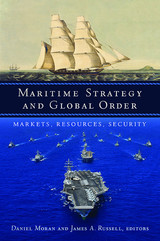
Taken for granted as the natural order of things, peace at sea is in fact an immense and recent achievement—but also an enormous strategic challenge if it is to be maintained in the future. In Maritime Strategy and Global Order, an international roster of top scholars offers historical perspectives and contemporary analysis to explore the role of naval power and maritime trade in creating the international system.
The book begins in the early days of the industrial revolution with the foundational role of maritime strategy in building the British Empire. It continues into the era of naval disorder surrounding the two world wars, through the passing of the Pax Britannica and the rise of the Pax Americana, and then examines present-day regional security in hot spots like the South China Sea and Arctic Ocean. Additional chapters engage with important related topics such as maritime law, resource competition, warship evolution since the end of the Cold War, and naval intelligence.
A first-of-its-kind collection, Maritime Strategy and Global Order offers scholars, practitioners, students, and others with an interest in maritime history and strategic issues an absorbing long view of the role of the sea in creating the world we know.

While language instructors recognize the value of debate as a means of facilitating Advanced- and Superior-level skills, no single advanced Chinese textbook exists that provides level-specific scaffolded language exercises, rhetorical strategies, and topic-specific texts within the context of debate. Mastering Chinese through Global Debate, designed to meet the ACTFL proficiency guidelines and featuring content written by a professional Chinese journalist, offers learners the means to develop sophisticated language skills with the goal of achieving Superior-level proficiency.
The textbook provides sets of readings and exercises that culminate in debates on key cultural topics with fellow students at home and/or with native speakers abroad via teleconference technology. Each of the six chapters includes detailed explanations, idea maps, word banks, writing and speaking samples, varied drills, and a rhetorical methods section—all of which foster language and critical thinking skills and prepare students to analyze and debate on complex topics.
The textbook’s audio companion is available at press.georgetown.edu and includes MP3 files of the feature article and a mock debate in each chapter, as well as transcripts of the audio, encouraging students to both listen and read. Instructors can also access a free answer key on the Georgetown University Press website.

eTextbooks are now available through VitalSource.com!
Mastering English through Global Debate brings together rhetorical traditions and the best practices of ESL instruction to facilitate superior-level proficiency in the English language. Each chapter addresses a rich topic of debate, providing students with a set of prereading activities, texts covering both sides of a debate topic, and postreading comprehension and lexical development exercises—all of which foster the language and critical thinking skills needed for successful debates. A rhetorical methods section in each chapter integrates language and practice and prepares students for end-of-chapter debates. Using debate to develop advanced competency in a second language is a method that is finding increased interest among instructors and students alike, in both synchronous online teaching and the individual classroom. Students are prepared to participate fully in debates with their classmates—at home, abroad, or both.

Critical engagement with complex global issues that provides an effective approach to promoting linguistic proficiency and social responsibility
Mastering Italian through Global Debate is a one-semester textbook designed for students with Advanced-level Italian language skills, moving toward Superior and above. Over the course of each chapter, students gain linguistic and rhetorical skills as they prepare to debate on broad, timely topics, including environmental consciousness, immigration, wealth distribution, surveillance and privacy, cultural diversity, and education. Discussion of compelling issues promotes not only linguistic proficiency but social responsibility through critical engagement with complex global challenges.
Each chapter includes topic-specific reading texts and position papers, giving students insight into issues being widely discussed—and debated—in Italy today. In addition to pre- and post-reading activities, students benefit from lexical development exercises, rhetorical methods sections, and listening exercises with audio available on the Press website. Online resources for instructors include pedagogical recommendations and an answer key.
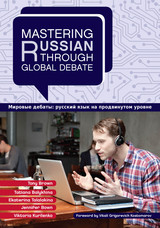
eTextbooks are now available through VitalSource.com!
Mastering Russian through Global Debate brings together the rhetorical traditions of the communications field and the best practices of adult second-language instruction to facilitate Superior-level proficiency in the Russian language. Each chapter addresses a rich topic of debate, providing students with a set of prereading activities, texts covering both sides of a debate topic, and continues with postreading comprehension and lexical development exercises—all of which foster the language and critical thinking skills needed for successful debates. A rhetorical methods section in each chapter integrates language and practice and prepares students for end-of-chapter debates. Using debate to develop advanced competency in a second language is a method that is finding increased interest among instructors and students alike, in both synchronous online teaching and the individual classroom. Students are prepared to participate fully in debates with their classmates—at home, abroad, or both.

Building superior Spanish language proficiency through critical engagement with global challenges
Mastering Spanish through Global Debate is a one-semester textbook designed for students with Advanced-level Spanish language skills, moving toward Superior. Over the course of each chapter, students gain linguistic and rhetorical skills as they prepare to debate on broad, timely topics, including environmental consciousness, immigration, wealth distribution, surveillance and privacy, cultural diversity, and education. Discussion of compelling issues promotes not only linguistic proficiency but social responsibility through critical engagement with complex global challenges.
Each chapter includes topic-specific reading texts and position papers by writers from various Spanish-speaking countries. In addition to pre- and post-reading activities, students benefit from lexical development exercises, rhetorical methods sections, and listening exercises with audio available on the Press website. An online instructor’s manual provides pedagogical recommendations and an answer key.
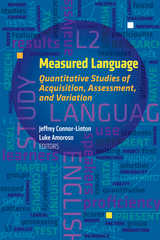
Measured Language: Quantitative Studies of Acquisition, Assessment, and Variation focuses on ways in which various aspects of language can be quantified and how measurement informs and advances our understanding of language. The metaphors and operationalizations of quantification serve as an important lingua franca for seemingly disparate areas of linguistic research, allowing methods and constructs to be translated from one area of linguistic investigation to another.
Measured Language includes forms of measurement and quantitative analysis current in diverse areas of linguistic research from language assessment to language change, from generative linguistics to experimental psycholinguistics, and from longitudinal studies to classroom research. Contributors demonstrate how to operationalize a construct, develop a reliable way to measure it, and finally validate that measurement—and share the relevance of their perspectives and findings to other areas of linguistic inquiry. The range and clarity of the research collected here ensures that even linguists who would not traditionally use quantitative methods will find this volume useful.

Measuring the Performance of the Hollow State is the first in-depth look at the influence of performance measurement on the effectiveness of the federal government. To do this, the authors examine the influence of the Government Performance and Results Act of 1993 (with consideration of the later Program Assessment Rating Tool of 2002) on federal performance measurement, agency performance, and program outcomes. They focus a systematic examination on five agencies in the U.S. Department of Health and Human Services—the Food and Drug Administration, the Centers for Medicare and Medicaid Services, the Health Resources and Services Administration, the National Institutes of Health, and the Indian Health Service. Besides representing a wide range of federal government organizational structures and program formats, these agencies offer a diverse array of third-party arrangements including states, native American tribes, scientists, medical schools, and commercial and nonprofit health care intermediaries and carriers.
Exploring the development of performance measures in light of widely varying program mandates, the authors look at issues that affect the quality of this measurement and particularly the influence of program performance by third parties. They consider factors such as goal conflict and ambiguity, politics, and the critical role of intergovernmental relations in federal program performance and performance measurement. Through their findings, they offer illumination to two major questions in public management today—what are the uses and limitations of performance measurement as a policy and management tool and how does performance measurement work when applied to the management of third-party government?
While scholars and students in public administration and governmental reform will find this book of particular interest, it will also be of use to anyone working in the public sector who would like to have a better understanding of performance measurement.
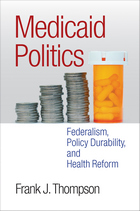
Medicaid, one of the largest federal programs in the United States, gives grants to states to provide health insurance for over 60 million low-income Americans. As private health insurance benefits have relentlessly eroded, the program has played an increasingly important role. Yet Medicaid’s prominence in the health care arena has come as a surprise.
Many astute observers of the Medicaid debate have long claimed that “a program for the poor is a poor program” prone to erosion because it serves a stigmatized, politically weak clientele. Means-tested programs for the poor are often politically unpopular, and there is pressure from fiscally conservative lawmakers to scale back the $350-billion-per-year program even as more and more Americans have come to rely on it. For their part, health reformers had long assumed that Medicaid would fade away as the country moved toward universal health insurance. Instead, Medicaid has proved remarkably durable, expanding and becoming a major pillar of America’s health insurance system.
In Medicaid Politics, political scientist Frank J. Thompson examines the program’s profound evolution during the presidential administrations of Bill Clinton, George W. Bush, and Barack Obama and its pivotal role in the epic health reform law of 2010. This clear and accessible book details the specific forces embedded in American federalism that contributed so much to Medicaid’s growth and durability during this period. It also looks to the future outlining the political dynamics that could yield major program retrenchment.

For over thirty years, David F. Kelly has worked with medical practitioners, students, families, and the sick and dying to confront the difficult and often painful issues that concern medical treatment at the end of life. In this short and practical book, Kelly shares his vast experience, providing a rich resource for thinking about life's most painful decisions.
Kelly outlines eight major issues regarding end-of-life care as seen through the lens of the Catholic medical ethics tradition. He looks at the distinction between ordinary and extraordinary means; the difference between killing and allowing to die; criteria of patient competence; what to do in the case of incompetent patients; the meaning and use of advance directives; the morality of hydration and nutrition; physician-assisted suicide and euthanasia; and medical futility. Kelly's analysis is sprinkled with significant legal decisions and, throughout, elaborations on how the Catholic medical ethics tradition—as well as teachings of bishops and popes—understands each issue. He provides a helpful glossary to supplement his introduction to the terminology used by philosophical health care ethics. Included in Kelly's discussion is his lucid description of why the Catholic tradition supports the discontinuation of medical care in the Terry Schiavo case. He also explores John Paul II's controversial papal allocution concerning hydration and nutrition for unconscious patients, arguing that the Catholic tradition does not require feeding the permanently unconscious.
Medical Care at the End of Life addresses the major issues that inform this last stage of caregiving. It offers a critical guide to understanding the medical ethics and relevant legal cases needed for clear thinking when individuals are faced with those crucial decisions.

In this book Paul Carrick charts the ancient Greek and Roman foundations of Western medical ethics. Surveying 1500 years of pre-Christian medical moral history, Carrick applies insights from ancient medical ethics to developments in contemporary medicine such as advance directives, gene therapy, physician-assisted suicide, abortion, and surrogate motherhood. He discusses such timeless issues as the social status of the physician; attitudes toward dying and death; and the relationship of medicine to philosophy, religion, and popular morality. Opinions of a wide range of ancient thinkers are consulted, including physicians, poets, philosophers, and patients. He also explores the puzzling question of Hippocrates' identity, analyzing not only the Hippocratic Oath but also the Father of Medicine's lesser-known works.
Complete with chapter discussion questions, illustrations, a map, and appendices of ethical codes, Medical Ethics in the Ancient World will be useful in courses on the medical humanities, ancient philosophy, bioethics, comparative cultures, and the history of medicine. Accessible to both professionals and to those with little background in medical philosophy or ancient science, Carrick's book demonstrates that in the ancient world, as in our own postmodern age, physicians, philosophers, and patients embraced a diverse array of perspectives on the most fundamental questions of life and death.

This book is the first comprehensive examination of medical ethics in the Renaissance. It investigates the ethical considerations, evaluations of procedures, and techniques of problem-solving in the writings of European physicians and surgeons from the mid-sixteenth through the mid-seventeenth centuries.
While much of the medical practice and literature of the Renaissance remained a continuation or reinterpretation of ancient medicine, Winfried Schleiner reveals an emerging self-conscious field of medical ethics that should be considered modern, as it increasingly separates medicine from theology, the cure of the body from that of the soul. The exceptions to this trend appear in the discussions of certain sexual topics, such as masturbation, by physicians close to the Counter-Reformation. Analyzing the writings of Protestant, Catholic, and Jewish physicians—the latter developed the most secular medical ethics of the era—he probes the dominant and emerging philosophical ideas together with conceptions of the role of physicians and of physical well-being.
Schleiner selects several topics to explore the development of ethical ideas in depth: placebos and the broader issue of lying to patients; the treatment of hysteria; masturbation; and the prevention of sexually transmitted diseases—subjects that are still highly charged moral as well as medical topics today.
This pioneering study will be of value to ethicists and to historians of science, medicine, and Renaissance and gender studies.
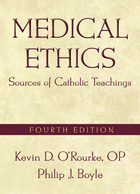
In a single convenient resource, this revised and updated edition of a classic text organizes and presents clearly the documents of the Catholic Church pertaining to medical ethics. Introductory chapters provide the context for interpreting the Church's teachings and theological values, guiding the reader in how to apply the teachings to particular ethical dilemmas and helping the reader to understand the role of conscience within the Catholic tradition.
The teaching of the Church in regard to health care ethics is pertinent not only for health care professionals and students, but for all who are concerned about the common good of society. Medical Ethics examines specific teachings of the Church on over seventy issues in clinical and research ethics, including abortion, AIDS, artificial insemination, assisted suicide, cloning, contraception, euthanasia, gene therapy, health care reform, organ donation and transplantation, organizational ethics, stem cells, surrogate motherhood, and withholding and withdrawing life support.
O'Rourke and Boyle bring this fourth edition up to the present day by incorporating recent papal documents regarding the social aspects of health care, assent to Church teaching, and the 2008 papal instruction Dignitas personae, an extremely influential document that illuminates such controversial dilemmas as prenatal adoption, frozen embryos, and genetic diagnosis.

In a single convenient resource, this book organizes and presents clearly the documents of the Catholic church pertaining to medical ethics. Introductory chapters provide the context for interpreting the Church's teachings and guide the reader in applying the teachings to particular ethical quandaries.
This third edition has been updated to incorporate the statements issued since the preparation of the second edition. The authors have revised the introductory chapters to include ideas from the papal encyclical Splendor Veritatis and "Instruction of the Ecclesial Vocation of the Theologian," published by the Vatican Congregation for the Doctrine of the Faith, concerning the various levels of the teachings of the Church. Other new statements included in this edition are relevant topics from the papal encyclical Evangelium Vitae (abortion, euthanasia, amniocentesis, suicide and withdrawing life support); the Vatican Congregation of Doctrine and Faith on uterine isolation; the U.S. bishops on the care of anencephalic infants, genetic testing, and cloning; and the Pennsylvania Catholic Conference on the treatment for rape in Catholic hospitals.
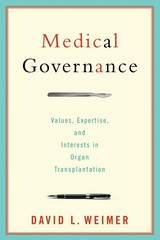
Governments throughout the industrialized world make decisions that fundamentally affect the quality and accessibility of medical care. In the United States, despite the absence of universal health insurance, these decisions have great influence on the practice of medicine.
In Medical Governance, David Weimer explores an alternative regulatory approach to medical care based on the delegation of decisions about the allocation of scarce medical resources to private nonprofit organizations. He investigates the specific development of rules for the U.S. organ transplant system and details the conversion of a voluntary network of transplant centers to one private rulemaker: the Organ Procurement and Transplantation Network (OPTN).
As the case unfolds, Weimer demonstrates that the OPTN is more efficient, nimble, and better at making evidence-based decisions than a public agency; and the OPTN also protects accountability and the public interest more than private for-profit organizations. Weimer addresses similar governance arrangements as they could apply to other areas of medicine, including medical records and the control of Medicare expenditures, making this timely and useful case study a valuable resource for debates over restructuring the U.S. health care system.

In these essays, a diverse group of ethicists draw insights from both religious and feminist scholarship in order to propose creative new approaches to the ethics of medical care. While traditional ethics emphasizes rules, justice, and fairness, the contributors to this volume embrace an "ethics of care," which regards emotional engagement in the lives of others as basic to discerning what we ought to do on their behalf.
The essays reflect on the three related themes: community, narrative, and emotion. They argue for the need to understand patients and caregivers alike as moral agents who are embedded in multiple communities, who seek to attain or promote healing partly through the medium of storytelling, and who do so by cultivating good emotional habits. A thought-provoking contribution to a field that has long been dominated by an ethics of principle, Medicine and the Ethics of Care will appeal to scholars and students who want to move beyond the constraints of that traditional approach.

The medical tradition that developed in the lands of Islam during the medieval period (c. 650-1500) has, like few others, influenced the fates and fortunes of countless human beings. It is a story of contact and cultural exchange across countries and creeds, affecting many people from kings to the common crowd. This tradition formed the roots from which modern Western medicine arose. Contrary to the stereotypical picture, medieval Islamic medicine was not simply a conduit for Greek ideas, but a venue for innovation and change.
Medieval Islamic Medicine is organized around five topics: the emergence of medieval Islamic medicine and its intense crosspollination with other cultures; the theoretical medical framework; the function of physicians within the larger society; medical care as seen through preserved case histories; and the role of magic and devout religious invocations in scholarly as well as everyday medicine. A concluding chapter on the "afterlife" concerns the impact of this tradition on modern European medical practices, and its continued practice today. The book includes an index of persons and their books; a timeline of developments in East and West; and a section on further reading.
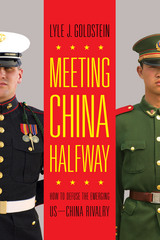
Though a US-China conflict is far from inevitable, major tensions are building in the Asia-Pacific region. These strains are the result of historical enmity, cultural divergence, and deep ideological estrangement, not to mention apprehensions fueled by geopolitical competition and the closely related “security dilemma.”
Despite worrying signs of intensifying rivalry, few observers have provided concrete paradigms to lead this troubled relationship away from disaster. This book is dramatically different in that Lyle J. Goldstein’s focus is on laying bare both US and Chinese perceptions of where their interests clash and proposing new paths to ease bilateral tensions through compromise. Each chapter contains a “cooperation spiral” —the opposite of an escalation spiral—to illustrate these policy proposals. Goldstein makes one hundred policy proposals over the course of this book to inaugurate a genuine debate regarding cooperative policy solutions to the most vexing problems in US-China relations.
Goldstein not only parses findings from American scholarship but also breaks new ground by analyzing hundreds of Chinese-language sources, including military publications, never before evaluated by Western experts. Meeting China Halfway, new in paperback, remains a refreshing and unique contribution to the study of the world’s most important bilateral relationship.

This is an engagingly personal account of the hardships, challenges, and rewards of a life lived wholly in the presence of God and at the service of the Alaskan people. In September 1935, Segundo Llorente, a wide-eyed twenty-eight-year-old Jesuit priest from Spain set foot in Alaska for the the first time. His memoirs are filled with all that he saw, endured, and enjoyed for forty years in Uncle Sam's "icebox," whether by dogsled in the 1930s or by plane and snowmobile in the 1970s. He prayed, worked, scolded, helped, and laughed with a practical wisdom that recalls the Ignatian spirituality in everyday life that also marks Father Walter Cisek's Russian journal, He Leadeth Me.

With a new foreword by New York's former governor, Mario Cuomo, this revised and updated edition of Memos to the Governor is a concise guidebook that takes the reader behind governmental fiscal gobbledygook to explain in clear, understandable prose the technical, economic, and political dynamics of budget making. At all levels of government, the budget has become the battleground for policymaking and politics. This book helps current and future public administrators untangle the knotty processes of budget preparation and implementation.
Dall W. Forsythe, who served as budget director under Governor Cuomo, outlines the budgeting process through a series of memos from a budget director to a newly elected governor—a format that helps readers with little or no background to understand complicated financial issues. He covers all of the steps of budget preparation, from strategy to execution, explaining technical vocabulary, and discussing key topics including baseline budgeting, revenue forecasting, and gap-closing options.
Forsythe brings fresh insights into such issues as the importance of a multiyear strategic budget plan, the impact of the business cycle on state budgets, the tactical problems of getting budgets adopted by legislatures, and, of course, the relationship between governor and budget officer. Memos to the Governor is a painless, practical introduction to budget preparation for students of and practitioners in public administration and public-sector financial management.
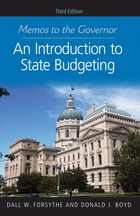
This revised and updated edition of Memos to the Governor is a concise and highly readable guidebook that explains in clear, understandable prose the technical, economic, and political dynamics of budget making. Updated with many new examples of budget quandaries from recent years, this book helps current and future public administrators untangle the knotty processes of budget preparation and implementation.
Authors Dall W. Forsythe and Donald J. Boyd outline the budgeting process through a series of memos from a budget director to a newly elected governor—a format that helps readers with little or no background understand complicated financial issues. They cover all of the steps of budget preparation, from strategy to execution, explaining technical vocabulary, and discussing key topics including baseline budgeting, revenue forecasting, and gap-closing options.
Forsythe and Boyd bring fresh insights into such issues as the importance of a multiyear strategic budget plan, the impact of the business cycle on state budgets, the tactical problems of getting budgets adopted by legislatures, and, of course, the relationship between governor and budget officer. Memos to the Governor is a painless, practical introduction to budget preparation for students of and practitioners in public administration and public-sector financial management.

Medical ethics draws upon methods from a wide array of disciplines, including anthropology, economics, epidemiology, health services research, history, law, medicine, nursing, philosophy, psychology, sociology, and theology.
In this first book to systematically examine, critique, and challenge some of these disciplines and their methods in light of their influence on medical ethics, leading scholars present particular methods that have played significant roles in the field. The methods addressed include philosophy, religion and theology, professional codes, law, casuistry, history, qualitative research, ethnography, quantitative surveys, experimental methods, and economics and decision science. Reviewing each, they provide descriptions of techniques, critiques, and notes on resources and training. Physician-assisted suicide and euthanasia are used as an illustration of the richness of multidisciplinary work applied to individual issues. Similarly, genetic testing is used as an example of how multiple descriptive methods may privilege certain findings.
Methods in Medical Ethics is a valuable resource for scholars, teachers, editors, and students in any of the disciplines that have contributed to the field. As a textbook and reference for graduate students and scholars in medical ethics, it offers a rich understanding of the complexities of both moral questions and their answers.
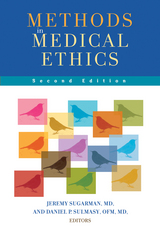
Medical ethics draws upon methods from a wide array of disciplines, including anthropology, economics, epidemiology, health services research, history, law, medicine, nursing, philosophy, psychology, sociology, and theology.
In this influential book, outstanding scholars in medical ethics bring these many methods together in one place to be systematically described, critiqued, and challenged. Newly revised and updated chapters in this second edition include philosophy, religion and theology, virtue and professionalism, casuistry and clinical ethics, law, history, qualitative research, ethnography, quantitative surveys, experimental methods, and economics and decision science. This second edition also includes new chapters on literature and sociology, as well as a second chapter on philosophy which expands the range of philosophical methods discussed to include gender ethics, communitarianism, and discourse ethics. In each of these chapters, contributors provide descriptions of the methods, critiques, and notes on resources and training.
Methods in Medical Ethics is a valuable resource for scholars, teachers, editors, and students in any of the disciplines that have contributed to the field. As a textbook and reference for graduate students and scholars in medical ethics, it offers a rich understanding of the complexities involved in the rigorous investigation of moral questions in medical practice and research.

Metropolitan Governance is the first book to bring together competing perspectives on the question and consequences of centralized vs. decentralized regional government. Presenting original contributions by some of the most notable names in the field of urban politics, this volume examines the organization of governments in metropolitan areas, and how that has an effect on both politics and policy.
Existing work on metropolitan governments debates the consequences of interjurisdictional competition, but neglects the role of cooperation in a decentralized system. Feiock and his contributors provide evidence that local governments successfully cooperate through a web of voluntary agreements and associations, and through collective choices of citizens. This kind of "institutional collective action" is the glue that holds institutionally fragmented communities together.
The theory of institutional collective action developed here illustrates the dynamics of decentralized governance and identifies the various ways governments cooperate and compete. Metropolitan Governance provides insight into the central role that municipal governments play in the governance of metropolitan areas. It explores the theory of institutional collective action through empirical studies of land use decisions, economic development, regional partnerships, school choice, morality issues, and boundary change—among other issues.
A one-of-a-kind, comprehensive analytical inquiry invaluable for students of political science, urban and regional planning, and public administration—as well as for scholars of urban affairs and urban politics and policymakers—Metropolitan Governance blazes new territory in the urban landscape.
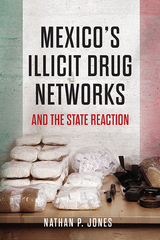
Mexican drug networks are large and violent, engaging in activities like the trafficking of narcotics, money laundering, extortion, kidnapping, and mass murder. Despite the impact of these activities in Mexico and abroad, these illicit networks are remarkably resilient to state intervention.
Drawing on extensive fieldwork and interviews with US and Mexican law enforcement, government officials, organized crime victims, and criminals, Nathan P. Jones examines the comparative resilience of two basic types of drug networks—“territorial” and “transactional”—that are differentiated by their business strategies and provoke wildly different responses from the state. Transactional networks focus on trafficking and are more likely to collude with the state through corruption, while territorial networks that seek to control territory for the purpose of taxation, extortion, and their own security often trigger a strong backlash from the state.
Timely and authoritative, Mexico's Illicit Drug Networks and the State Reaction provides crucial insight into why Mexico targets some drug networks over others, reassesses the impact of the war on drugs, and proposes new solutions for weak states in their battles with drug networks.

An increasing number of U.S. Latinos are seeking to become more proficient in Spanish. The Spanish they may have been exposed to in childhood may not be sufficient when they find themselves as adults in more demanding environments, academic or professional. Heritage language learners appear in a wide spectrum of proficiency, from those who have a low level of speaking abilities, to those who may have a higher degree of bilingualism, but not fluent. Whatever the individual case may be, these heritage speakers of Spanish have different linguistic and pedagogical needs than those students learning Spanish as a second or foreign language.
The members of the American Association of Teachers of Spanish and Portuguese (AATSP) have identified teaching heritage learners as their second greatest area of concern (after proficiency testing). Editors Ana Roca and Cecilia Colombi saw a great need for greater availability and dissemination of scholarly research in applied linguistics and pedagogy that address the development and maintenance of Spanish as a heritage language and the teaching of Spanish to U.S. Hispanic bilingual students in grades K-16. The result is Mi lengua: Spanish as a Heritage Language in the United States.
Mi lengua delves into the research, theory, and practice of teaching Spanish as a heritage language in the United States. The editors and contributors examine theoretical considerations in the field of Heritage Language Development (HLD) as well as community and classroom-based research studies at the elementary, secondary, and university levels. Some chapters are written in Spanish and each chapter presents a practical section on pedagogical implications that provides practice-related suggestions for the teaching of Spanish as a heritage language to students from elementary grades to secondary and college and university levels.
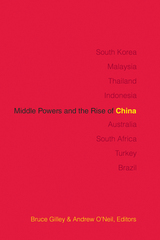
China’s rise is changing the dynamics of the international system. Middle Powers and the Rise of China is the first work to examine how the group of states referred to as “middle powers” are responding to China’s growing economic, diplomatic, and military power. States with capabilities immediately below those of great powers, middle powers still exercise influence far above most other states. Their role as significant trading partners and allies or adversaries in matters of regional security, nuclear proliferation, and global governance issues such as human rights and climate change are reshaping international politics.
Contributors review middle-power relations with China in the cases of South Korea, Malaysia, Thailand, Indonesia, Australia, South Africa, Turkey, and Brazil, addressing how these diverse nations are responding to a rising China, the impact of Chinese power on each, and whether these states are being attracted to China or deterred by its new power and assertiveness. Chapters also explore how much (or how little) China, and for comparison the US, value middle powers and examine whether or not middle powers can actually shape China’s behavior. By bringing a new analytic approach to a key issue in international politics, this unique treatment of emerging middle powers and the rise of China will interest scholars and students of international relations, security studies, China, and the diverse countries covered in the book.

This expanded edition serves as a comprehensive reference guide as well as a systematic, learner-centered approach for native English-speaking students. The author addresses the most common problems of writing in French, and progresses from words to sentences to paragraphs to the elaboration of accurate and authentic expository prose.

Military Strategy, Joint Operations, and Airpower will introduce readers to contemporary strategy and the operational level of war, particularly as it relates to airpower.
This intermediate textbook was developed as required reading for all US Air Force Academy cadets, and is designed to close the gap between military theory and military practice. It asks readers to reconceive of the military as a “profession of effects” rather than as a profession of arms because much of the military's work and impact no longer involves kinetic warfare.
The book covers strategic foundations; operational design and joint-service operations; the air, space, and cyber capabilities that make up modern airpower; and contemporary challenges in the application of strategy. The contributing authors include both military practitioners and scholars of security studies, political science, and history.
In addition to being required reading for Air Force Academy cadets, the book will provide an essential overview of strategy and practice for anyone interested in modern airpower and the joint operating environment.

An essential introduction to contemporary strategy at the operational level of war, now in its second edition
Military Strategy, Joint Operations, and Airpower introduces contemporary strategy at the operational level of war, particularly as it relates to airpower. Developed as foundational reading for all US Air Force Academy cadets, Air Force ROTC students, and Officer Training School candidates, this intermediate textbook is designed to close the gap between military theory and practice. It covers strategic foundations; operational design and joint-service operations; the air, space, and cyber capabilities that comprise modern airpower; and contemporary challenges in the application of strategy.
In this second edition, each chapter has been updated and revised, and several sections have been expanded. Part 2, “Military Forces and the Joint Fight,” now features separate chapters about each service. Similarly, operational design is expanded from one to four chapters to provide a more thorough step-by-step guide through the process. New chapters in this second edition include “Integrating the Instruments of Power,” “The Spectrum of Conflict and Range of Military Operations,” and “The Nuclear Weapons Triad and Missile Defense.”
Military Strategy, Joint Operations, and Airpower’s contributing authors and editors include both military practitioners and scholars of security studies, political science, and history. In addition to being required reading for US Air Force cadets, the book provides an essential overview of strategy and practice for anyone interested in modern airpower.

How do people learn nonnative languages? Is there one part or function of our brains solely dedicated to language processing, or do we apply our general information-processing abilities when learning a new language? In this book, an interdisciplinary collaboration of scholars and researchers presents an overview of the latter approach to adult second language acquisition and brings together, for the first time, a comprehensive picture of the latest research on this subject.
Clearly organized into four distinct but integrated parts, Mind and Context in Adult Second Language Acquisition first provides an introduction to information-processing approaches and the tools for students to understand the data. The next sections explain factors that affect language learning, both internal (attention and awareness, individual differences, and the neural bases of language acquisition) and external (input, interaction, and pedagogical interventions). It concludes by looking at two pedagogical applications: processing instruction and content based instruction.
This important and timely volume is a must-read for students of language learning, second language acquisition, and linguists who want to better understand the information-processing approaches to learning a non-primary language. This book will also be of immense interest to language scholars, program directors, teachers, and administrators in both second language acquisition and cognitive psychology.
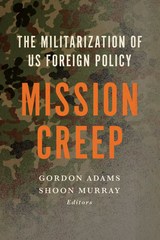
Mission Creep: The Militarization of US Foreign Policy? examines the question of whether the US Department of Defense (DOD) has assumed too large a role in influencing and implementing US foreign policy. After the Cold War, and accelerating after September 11, the United States has drawn upon the enormous resources of DOD in adjusting to the new global environment and challenges arising from terrorism, Islamic radicalism, insurgencies, ethnic conflicts, and failed states.
Contributors investigate and provide different perspectives on the extent to which military leaders and DOD have increased their influence and involvement in areas such as foreign aid, development, diplomacy, policy debates, and covert operations. These developments are set in historical and institutional context, as contributors explore the various causes for this institutional imbalance. The book concludes that there has been a militarization of US foreign policy while it explores the institutional and political causes and their implications.
“Militarization” as it is used in this book does not mean that generals directly challenge civilian control over policy; rather it entails a subtle phenomenon wherein the military increasingly becomes the primary actor and face of US policy abroad. Mission Creep’s assessment and policy recommendations about how to rebalance the role of civilian agencies in foreign policy decision making and implementation will interest scholars and students of US foreign policy, defense policy, and security studies, as well as policy practitioners interested in the limits and extents of militarization.

The Modern Arabic Literary Language is a thoughtful examination of the changes that the Arabic language has undergone in its transition from its roots in classical Arabic to a language able to meet the demands of twentieth-century life.
In this volume a respected and masterful scholar of the Arabic language Jaroslav Stetkevych notes the ways that new words have been incorporated into the language, ranging from deriving new terms from existing roots (for example, the word for "newspaper" derives from the word meaning "sheet to write on") to downright assimilation of foreign words. Also noting the changes in grammar and semantics, Stetkevych illustrates how literary Arabic has become a more flexible language. Originally published in 1970, this volume is a clear assessment of lexical and stylistic developments in Modern Literary Arabic.
This classic book is an important resource for scholars and advanced students of Arabic language and linguistics who wish to study the complexities of language change and lexical expansion.

In this succinct introduction to modern Arabic literature of the nineteenth and twentieth centuries, Paul Starkey traces its development from the medieval Arabic literary tradition—beginning in the sixth-century with nomadic Bedouin poetry and the Qur'an—through new literary forms adapted from Western imaginative literature. He explores the interaction between social, political, and cultural change in the Middle East and northern Africa and the development of a modern Arabic literary tradition.
From the early nineteenth century through World War I, the Western genres of poetry, the novel, short story, and drama reached various parts of the Arabic-speaking world. Starkey discusses the resultant evolution of Arabic literature in separate sections on poetry, prose writing, and the theatre in Egypt, the Levant, Iraq, and northern Africa, from early contact through the emergence of women's literary voices in the 1960s to contemporary writers.
Arabic terms are presented in transcription, and an extensive bibliography provides suggestions for further reading. Modern Arabic Literature is the perfect introduction for readers interested in the contemporary Middle East or in comparative, colonial, world, or modern literature.

The revised and updated edition of Modern Arabic takes this authoritative, concise linguistic description of the structure and use of modern Arabic to an invaluable new level. Clive Holes traces the development of the Arabic language from Classical Arabic, the written language used in the 7th century for the Qur'an and poetry, through the increasingly symbiotic use of Modern Standard Arabic or MSA (the language of writing and formal speech) and dialectal Arabic (the language of normal conversation). He shows how Arabic has been shaped over the centuries by migration, urbanization, and education—giving us "a balanced, dispassionate, and accurate picture of the structures, functions, and varieties of the contemporary Arabic language."
Holes explains the structural characteristics—phonology, morphology, syntax, semantics, and lexical and stylistic developments—that the majority of the dialects share, as distinguished from Modern Standard Arabic. He also shows how native speakers use both types of Arabic for different purposes, with MSA being the language of power and control as used on television and in political speeches, and the dialects serving as the language of intimacy and domesticity. He further shows how MSA and spoken dialects are not as compartmentalized as one might be led to believe. Modern Arabic illustrates the use of the Arabic language in real life, whether in conversation, news bulletins and newspaper articles, serious literature, or song.
This new edition takes into account research published in several areas of Arabic linguistics since the first edition was published in 1995. It includes more extensive comment on the North African Arabic vocabulary of Modern Standard Arabic, more information about "mixed" varieties of written Arabic that are not in MSA (especially in Egypt), updated references, explanations, and many new examples. All Arabic is transcribed, except for an appendix presenting the Arabic alphabet and script. Students of the Arabic language will find Modern Arabic without peer—as will those general linguists who are interested in discovering how Arabic compares structurally and sociolinguistically with European languages.

As western economies have moved from feudalism to industrialism to the information age, Catholic social thought has kept pace, responding to the economic realities of the day. Linking Catholic social teaching with modern economic theory, Albino F. Barrera examines the changing political economy embedded within the moral theology and social justice documents issued by the Church during the last hundred years.
Barrera discusses the evolution of Catholic social teachings, from scholastic thinking on the concept of the "just price" to a modern emphasis on the importance of a living wage. As the conduct of economic life according to traditional custom and common law has given way to institutional and impersonal market forces, these teachings have moved from a preoccupation with personal moral behavior to an intense scrutiny of the structures of society. Amidst these changes, the Church's social documents have sought to address systemic shortcomings as a means of promoting the common good through economic justice.
Barrera also looks ahead to the challenges posed by a postindustrial society characterized by a global, knowledge-based economy, arguing that Catholic social thought will likely shift its focus from advocacy of the living wage to demands for greater equality of socioeconomic participation. Written for scholars and students of economics, theology, and political science interested in religious social thought, this book bridges the gap between moral theology and economic theory.

With an equal emphasis on every word in the title—and with a distinctly American perspective—Himes and his distinguished associate editors and contributors, have assembled the most thorough and authoritative assessment of modern Roman Catholic social teaching to date, likely to remain the touchstone volume for decades. This culmination of many years of effort by twenty stellar scholars has produced a reference work for anyone interested in understanding or studying the key documents that comprise the central corpus of Catholic social teaching.
In addition to interrogations of the major documents, this volume provides an understanding of the biblical and philosophical foundations of Catholic social teaching, addresses the doctrinal issues that arise in such a context, and explores the social thought leading up to the "modern" era, generally accepted as beginning in 1891 with the publication of Pope Leo XIII's Rerum Novarum. Finally, there is a review of how Catholic social teaching has been received in the United States, and an informed look at the shortcomings and questions that future generations must address.
By any standard, Modern Catholic Social Teaching is a remarkable work—intellectually rigorous and deeply faithful, it provides accessible and thought-provoking insights into the heart of a belief tradition that every Catholic will find invaluable.

Including contributions from twenty-two leading moral theologians, this volume is the most thorough assessment of modern Roman Catholic social teaching available. In addition to interrogations of the major documents, it provides insight into the biblical and philosophical foundations of Catholic social teaching, addresses the doctrinal issues that arise in such a context, and explores the social thought leading up to the "modern" era, which is generally accepted as beginning in 1891 with the publication of Pope Leo XIII's Rerum Novarum. The book also includes a review of how Catholic social teaching has been received in the United States and offers an informed look at the shortcomings and questions that future generations must address. This second edition includes revised and updated essays as well as two new commentaries: one on Pope Benedict XVI's encyclical Caritas in Veritate and one on Pope Francis's encyclical Laudato Si'. An outstanding reference work for anyone interested in studying and understanding the key documents that make up the central corpus of modern Catholic social teaching.

Modern Iraqi Arabic with MP3 Files is an introductory textbook—suitable for classroom or self-study—for those with no previous knowledge of Arabic or those who know Arabic but want to learn the Iraqi dialect. A detailed discussion of the consonants, vowels, and other characteristics of Iraqi phonetics—including pronunciation exercises on the CD—serves the needs of travelers, businesspeople, diplomats, archaeologists, and scholars who want to learn to speak the language quickly and efficiently.
Using the dialect of middle-class Baghdad, twenty lessons are arranged in a story-like format and are based on everyday travel situations. From arriving at the airport to getting to the hotel, students will learn proper greetings and introductions; how to ask for directions, take a taxi, and tell time; and prepare for daily activities like visiting the bank, museum, post office, and restaurants. The book contains basic dialogue, grammar, vocabulary, drills, and an extensive glossary. A section of idiomatic phrases, accompanied by their cultural, religious, or proverbial explanations, offers insight into current Iraqi culture.
NEW TO THIS EDITION: • Arabic script has been added so the reader has a choice of following the Arabic writing or the transcription in the Roman alphabet. • Four entirely new lessons cover medical care, media (radio, television, and journalism), telephone conversations, and cultural and folkloric tales. • All audio materials from the first edition—plus new audio materials for the new lessons—are included as MP3 files on a CD bound into the book.

Stressing the fundamental structural features of contemporary spoken Russian, these eighteen audio-lingual lessons primarily employ imitation and repetition exercises. Also included are reading selections, a pronunciation guide, a Russian-English vocabulary, and an index—all keyed to the first-year studies of a two-year speaking proficiency program.

Conventional wisdom would have it that believing in one God is straightforward; that Muslims are expert at monotheism, but that Christians complicate it, weaken it, or perhaps even abandon it altogether by speaking of the Trinity. In this book, Muslim and Christian scholars challenge that opinion. Examining together scripture texts and theological reflections from both traditions, they show that the oneness of God is taken as axiomatic in both, and also that affirming God's unity has raised complex theological questions for both. The two faiths are not identical, but what divides them is not the number of gods they believe in.
The latest volume of proceedings of The Building Bridges Seminar—a gathering of scholar-practitioners of Islam and Christianity that meets annually for the purpose of deep study of scripture and other texts carefully selected for their pertinence to the year’s chosen theme—this book begins with a retrospective on the seminar’s first fifteen years and concludes with an account of deliberations and discussions among participants, thereby providing insight into the model of vigorous and respectful dialogue that characterizes this initiative.
Contributors include Richard Bauckham, Sidney Griffith, Christoph Schwöbel, Janet Soskice, Asma Afsaruddin, Maria Dakake, Martin Nguyen, and Sajjad Rizvi. To encourage further dialogical study, the volume includes those scripture passages and other texts on which their essays comment. A unique resource for scholars, students, and professors of Christianity and Islam.

Comprehensive in its approach yet written in plain language, The Moral Bond of Community offers a biblically-based concept of Christian justice that can be applied to moral questions in everyday life.
Brady examines four forms of Christian moral discourse — narrative, prophetic, ethical, and policy — and shows how each contributes to a fuller understanding of Christian morality.

In this collection of recent essays (1988-92), all but one previously unavailable in English, noted theologian Josef Fuchs, SJ, examines key issues in normative morality. Identifying two strains, one based on natural law and a more situational one based on the Golden Rule, he explores the need for plurality in both individual and societal ethics, and the problem of universal versus only general validity. Central ideas that Fuchs develops are the concept of innovative morality as the individual's responsible search for God's will in personal situations; and the significance of the conscience in the face of official statements by the church's magisterium. Among the topics he considers are marriage and sexuality; the beginning and end of life; and international solidarity and social justice.
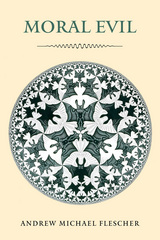
The idea of moral evil has always held a special place in philosophy and theology because the existence of evil has implications for the dignity of the human and the limits of human action. Andrew Michael Flescher proposes four interpretations of evil, drawing on philosophical and theological sources and using them to trace through history the moral traditions that are associated with them.
The first model, evil as the presence of badness, offers a traditional dualistic model represented by Manicheanism. The second, evil leading to goodness through suffering, presents a theological interpretation known as theodicy. Absence of badness—that is, evil as a social construction—is the third model. The fourth, evil as the absence of goodness, describes when evil exists in lieu of the good—the "privation" thesis staked out nearly two millennia ago by Christian theologian St. Augustine. Flescher extends this fourth model—evil as privation—into a fifth, which incorporates a virtue ethic. Drawing original connections between Augustine and Aristotle, Flescher’s fifth model emphasizes the formation of altruistic habits that can lead us to better moral choices throughout our lives.
Flescher eschews the temptation to think of human agents who commit evil as outside the norm of human experience. Instead, through the honing of moral skills and the practice of attending to the needs of others to a greater degree than we currently do, Flescher offers a plausible and hopeful approach to the reality of moral evil.

Pope John Paul II is the second longest serving pope in history and the longest serving pope of the last century. His presence has thrown a long shadow across our time, and his influence on Catholics and non-Catholics throughout the world cannot be denied. Much has been written about this pope, but until now, no one has provided a systematic and thorough analysis of the moral theology that underlies his moral teachings and its astonishing influence. And no one is better positioned to do this than Charles E. Curran, widely recognized as the leading American Catholic moral theologian.
Curran focuses on the authoritative statements, specifically the fourteen papal encyclicals the pope has written over the past twenty-five years, to examine how well the pope has addressed the broad issues and problems in the Church today. Curran begins with a discussion of the theological presuppositions of John Paul II's moral teaching and moral theology. Subsequent chapters address his theological methodology, his ethical methodology, and his fundamental moral theology together with his understanding of human life. Finally, Curran deals with the specific issues of globalization, marriage, conscience, human acts, and the many issues involved in social and sexual ethics.
While finding much to admire, Curran is nonetheless fiercely precise in his analysis and rigorously thoughtful in his criticism of much of the methodological aspects of the pope's moral theology—in his use of scripture, tradition, and previous hierarchical teaching; in theological aspects including Christology, eschatology, and the validity of human sources of moral wisdom and knowledge; and in anthropology, the ethical model and natural law. Brilliantly constructed and fearlessly argued, this will be the definitive measure of Pope John Paul II's moral theology for years to come.

Joseph Cardinal Bernardin of Chicago was for twenty years the most influential U.S. Catholic bishop; he was also a beloved public figure whose views commanded respect from Catholics and non-Catholics alike. This posthumous collection of a number of his major addresses on central moral issues in contemporary American life voices the causes that were closest to his heart: the sanctity and protection of all human life, the reshaping of American society and institutions for the benefit of the poorest, the preservation of peace in the pursuit of justice, and the growth of mutual understanding and harmony within the Church.
Spanning the period from the early 1980s to just weeks before his death in late 1996, these essays demonstrate a remarkably sustained and thoughtful effort to articulate an overall framework for moral decisions — "a consistent ethic of life" — and to affirm an active role for religious convictions in a pluralist democratic society. Cardinal Bernardin applies the Church’s moral and social teachings to complex policy issues in a way that respects religious freedom and invites both reflection from Catholics and dialogue with people of other beliefs.
Written in a clear and accessible style, this volume will be of value to everyone interested in Cardinal Bernardin’s moral vision for political choices. It will also be important for a wide range of readers concerned with in Christian ethics and the role of religion in the public sphere.
Joseph Cardinal Bernardin (1928-1996) served as the archbishop of Chicago from 1982 to 1996 and as archbishop of Cincinnati from 1972 to 1982. He was made a cardinal by Pope John Paul II in 1983 and received the Presidential Medal of Freedom in 1996 for his contribution to American civic life. He wrote The Gift of Peace (Loyola University Press, 1997).

A concise and accessible introduction to natural law ethics, this book introduces readers to the mainstream tradition of Western moral philosophy. Building on philosophers from Plato through Aquinas to John Finnis, Alfonso Gómez-Lobo links morality to the protection of basic human goods — life, family, friendship, work and play, the experience of beauty, knowledge, and integrity — elements essential to a flourishing, happy human life.
Gómez-Lobo begins with a discussion of Plato's Crito as an introduction to the practice of moral philosophy, showing that it requires that its participants treat each other as equals and offer rational arguments to persuade each other. He then puts forth a general principle for practical rationality: one should pursue what is good and avoid what is bad. The human goods form the basis for moral norms that provide a standard by which actions can be evaluated: do they support or harm the human goods? He argues that moral norms should be understood as a system of rules whose rationale is the protection and enhancement of human goods. A moral norm that does not enjoin the preservation or enhancement of a specific good is unjustifiable. Shifting to a case study approach, Gómez-Lobo applies these principles to a discussion of abortion and euthanasia. The book ends with a brief treatment of rival positions, including utilitarianism and libertarianism, and of conscience as our ultimate moral guide.
Written as an introductory text for students of ethics and natural law, Morality and the Human Goods makes arguments consistent with Catholic teaching but is not based on theological considerations. The work falls squarely within the field of philosophical ethics and will be of interest to readers of any background.

Different forms of city government are in widespread use across the United States. The two most common structures are the mayor-council form and the council-manager form. In many large U.S. cities, there have been passionate movements to change the structure of city governments and equally intense efforts to defend an existing structure. Charter change (or preservation) is supported to solve problems such as legislative gridlock, corruption, weak executive leadership, short-range policies, or ineffective delivery of services. Some of these cities changed their form of government through referendum while other cities chose to retain the form in use.
More than Mayor or Manager offers in-depth case studies of fourteen large U.S. cities that have considered changing their form of government over the past two decades: St. Petersburg, Florida; Spokane, Washington; Hartford, Connecticut; Richmond, Virginia; San Diego, California; Oakland, California; Kansas City, Missouri; Grand Rapids, Michigan; Dallas, Texas; Cincinnati, Ohio; El Paso, Texas; Topeka, Kansas; St. Louis, Missouri; and Portland, Oregon. The case studies shed light on what these constitutional contests teach us about different forms of government—the causes that support movements for change, what the advocates of change promised, what is at stake for the nature of elected and professional leadership and the relationship between leaders, and why some referendums succeeded while others failed. This insightful volume will be of special interest to leaders and interest groups currently considering or facing efforts to change the form of government as well as scholars in the field of urban studies.

How Barbara Jordan used sacred and secular scriptures in her social activism
US Congresswoman Barbara Jordan is well-known as an interpreter and defender of the Constitution, particularly through her landmark speech during Richard Nixon’s 1974 impeachment hearings. However, before she developed faith in the Constitution, Jordan had faith in Christianity. In “My Faith in the Constitution is Whole”: Barbara Jordan and the Politics of Scripture, Robin L. Owens shows how Jordan turned her religious faith and her faith in the Constitution into a powerful civil religious expression of her social activism.
Owens begins by examining the lives and work of the nineteenth-century Black female orator-activists Maria W. Stewart and Anna Julia Cooper. Stewart and Cooper fought for emancipation and women’s rights by “scripturalizing,” or using religious scriptures to engage in political debate. Owens then demonstrates how Jordan built upon this tradition by treating the Constitution as an American “scripture” to advocate for racial justice and gender equality. Case studies of key speeches throughout Jordan’s career show how she quoted the Constitution and other founding documents as sacred texts, used them as sociolinguistic resources, and employed a discursive rhetorical strategy of indirection known as “signifying on scriptures.”
Jordan’s particular use of the Constitution—deeply connected with her background and religious, racial, and gender identity—represents the agency and power reflected in her speeches. Jordan’s strategies also illustrate a broader phenomenon of scripturalization outside of institutional religion and its rhetorical and interpretive possibilities.

Renowned linguist Kenneth L. Pike and his coauthors offer three previously unpublished essays that apply theoretical linguistic research to the areas of historical linguistics, cross-cultural communications, and text analysis.
"Toward the Historical Reconstruction of Matrix Patterns in Morphology" establishes a comprehensive theory of morphological structure based on a number of languages. "Understanding Misunderstanding as Cross-Cultural Emic Clash" examines the crucial role that language plays in the numerous problems encountered in contacts between people from divergent cultural backgrounds. "The Importance of Purposive Behavior in Text Analysis" explores the centrality of establishing the relationship of reality to what is actually expressed in a text.
READERS
Browse our collection.
PUBLISHERS
See BiblioVault's publisher services.
STUDENT SERVICES
Files for college accessibility offices.
UChicago Accessibility Resources
home | accessibility | search | about | contact us
BiblioVault ® 2001 - 2024
The University of Chicago Press









